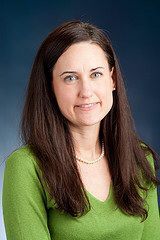Greater Texas Foundation Announces 2016 Class of GTF Fellows

Greater Texas Foundation has announced the newest class of Greater Texas Foundation Faculty Fellows (GTF Fellows), a three-year program to build research and teaching capacity of tenure-track faculty working in areas related to student success at Texas colleges. The four fellows, one of whom is Texas A&M University-Commerce's Dr. Brittany L. Hott, will each receive up to $30,000 per year for three years to support a research agenda aligned with the foundation's mission to support postsecondary preparation, access, persistence and completion for Texas students.
“With the addition of a new cohort each year, it is our hope that our fellows will create a broad and deep network of highly talented and committed Texas researchers working to understand barriers for students and identify research-based solutions to help more Texas students persist through completion of a postsecondary credential,” said Dr. Wynn Rosser, GTF president and CEO.
After being nominated through an invitation-only nomination process, the selected fellows were invited to participate in a competitive proposal process in which they were required to demonstrate significant potential in and commitment to a career in research and teaching at the postsecondary level. In addition, applicants were required to identify a mentor to assist them throughout the three-year fellowship. Each of the selected fellows' institutions committed to a partial match for the program.
“The GTF fellowship will provide the opportunity to extend my work in the area of school-based mathematics interventions to in-service teacher development. I am excited to learn and collaborate with GTF fellows, my mentor, Professor of Curriculum and Instruction at A&M-Commerce, Dr. Gil Naizer and GTF,” said Assistant Professor Department of Psychology, Counseling, and Special Education, Dr. Hott.
This fellowship makes possible Project DREAM (Developing Rural Educators' Algebra Methods), which explores the feasibility of sharing evidence-based practices through an interactive website tailored to teacher needs. Specifically, Project DREAM focuses on supporting teachers working with students from diverse backgrounds, such as non-native English speakers, students from low socio-economic backgrounds and students with math difficulty or disability in rural East Texas.


